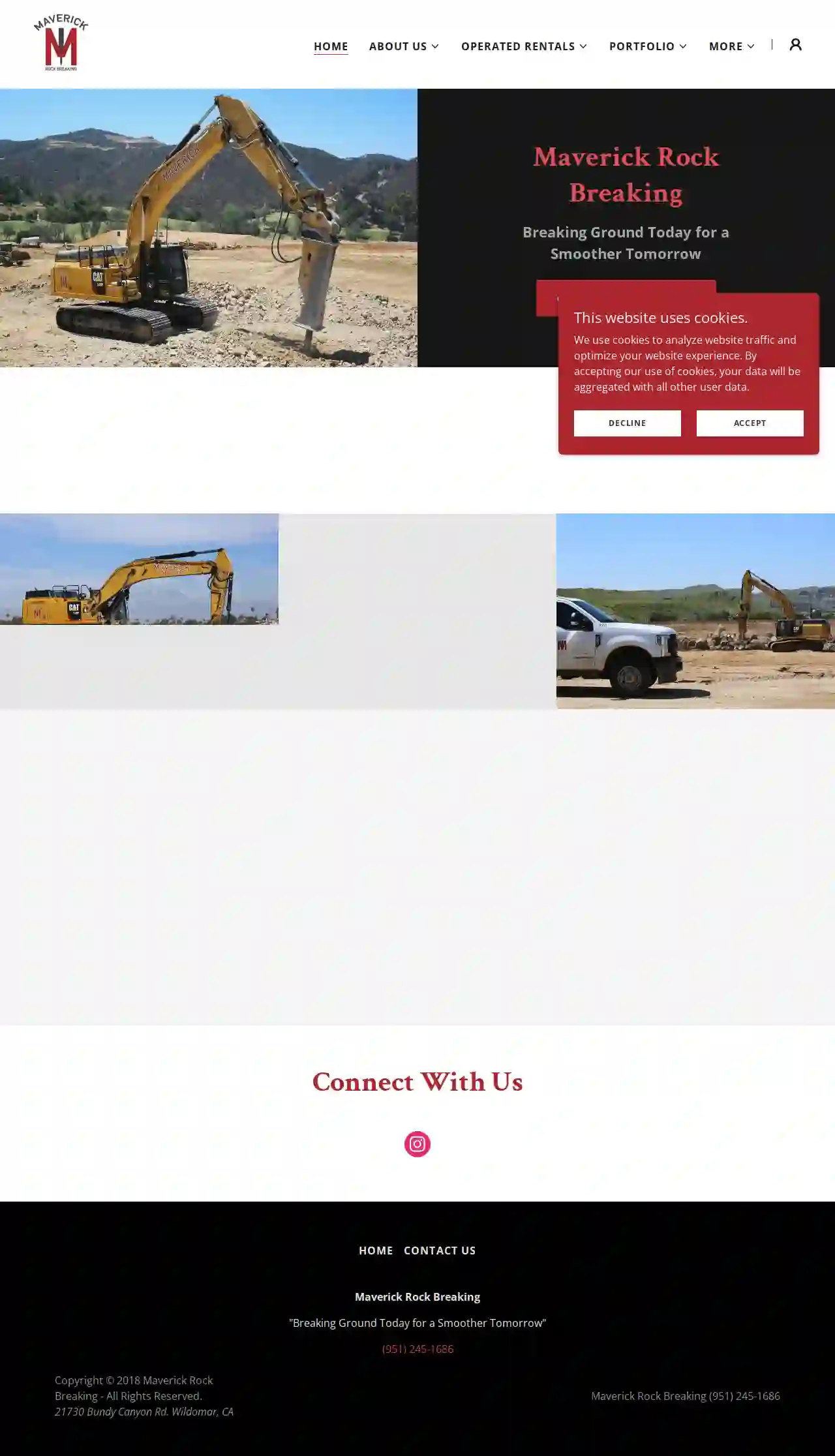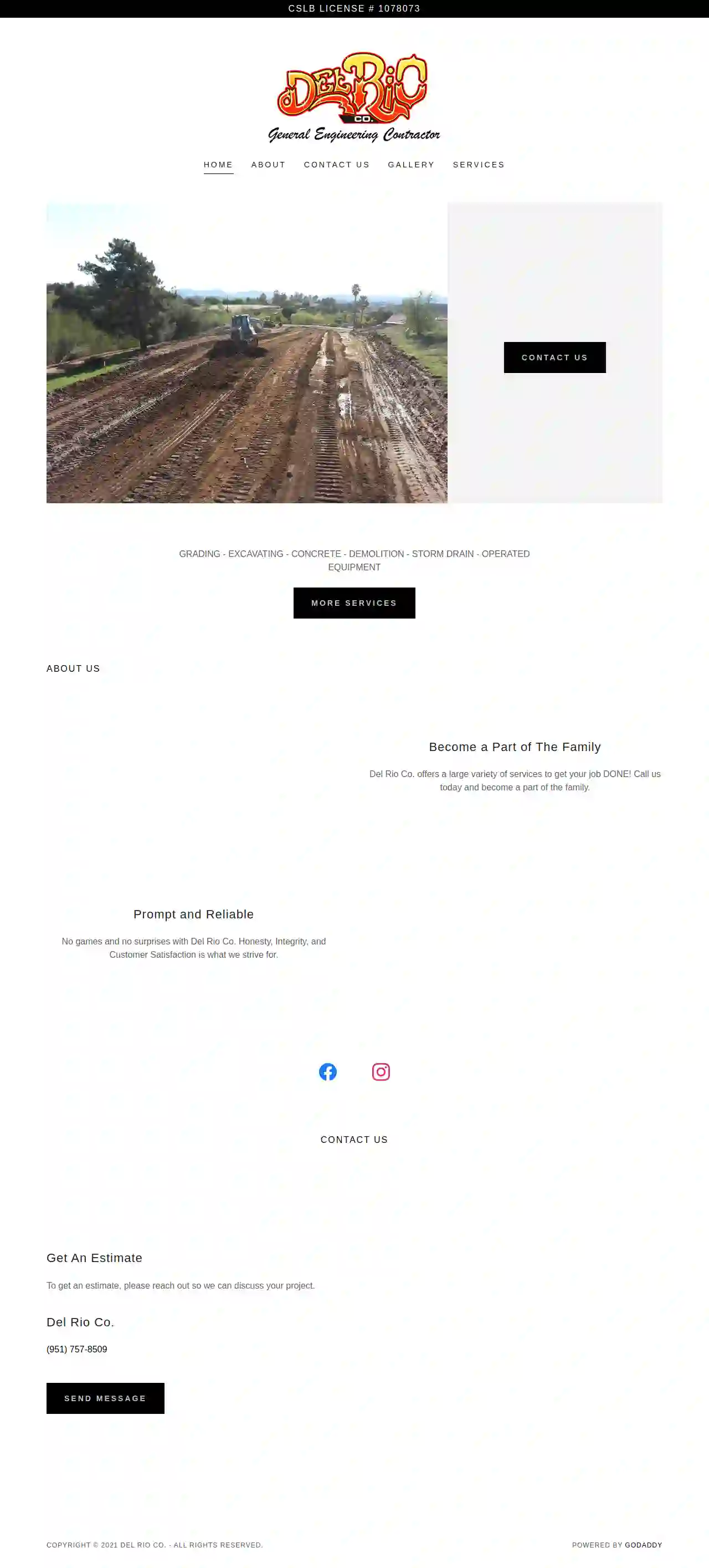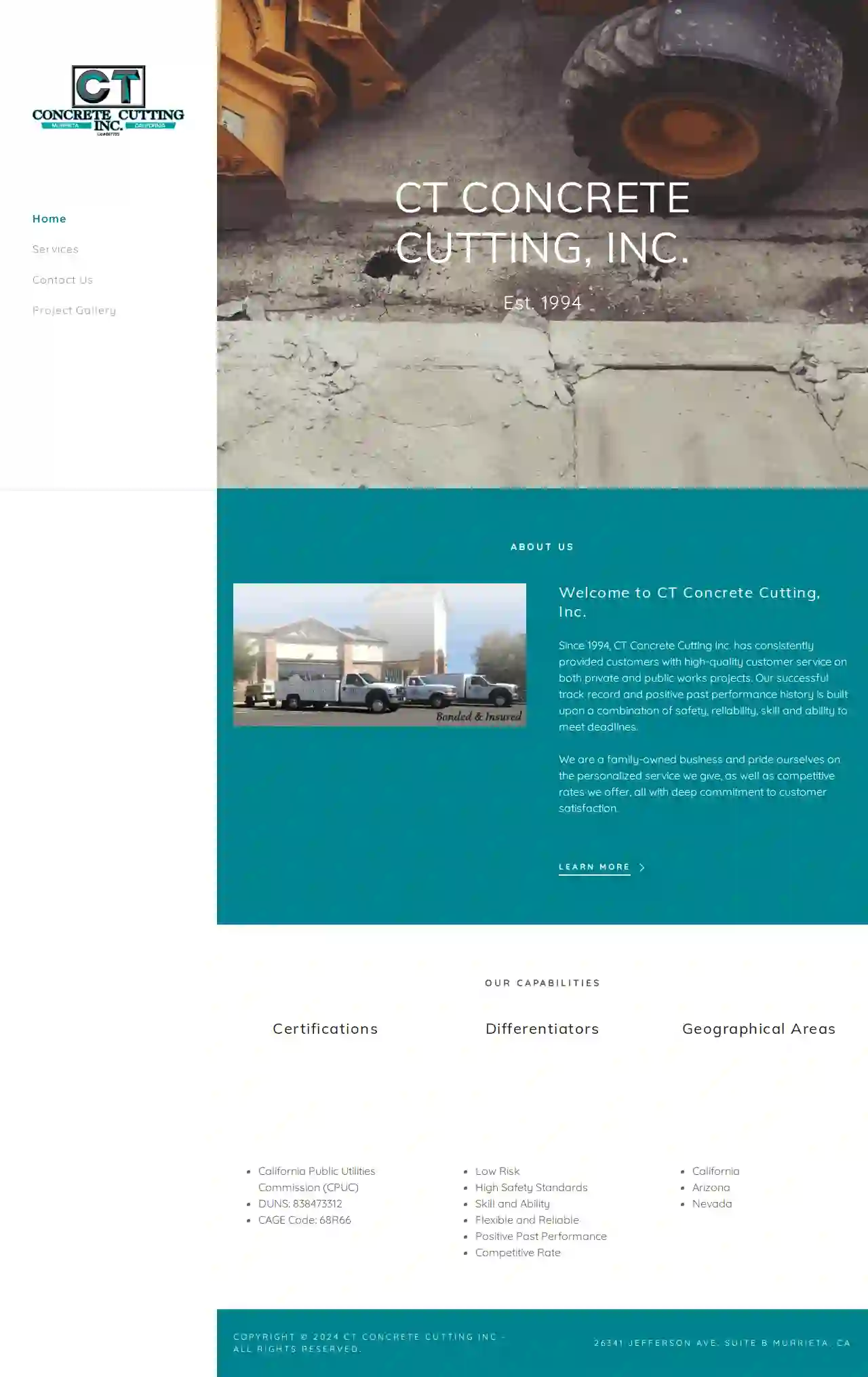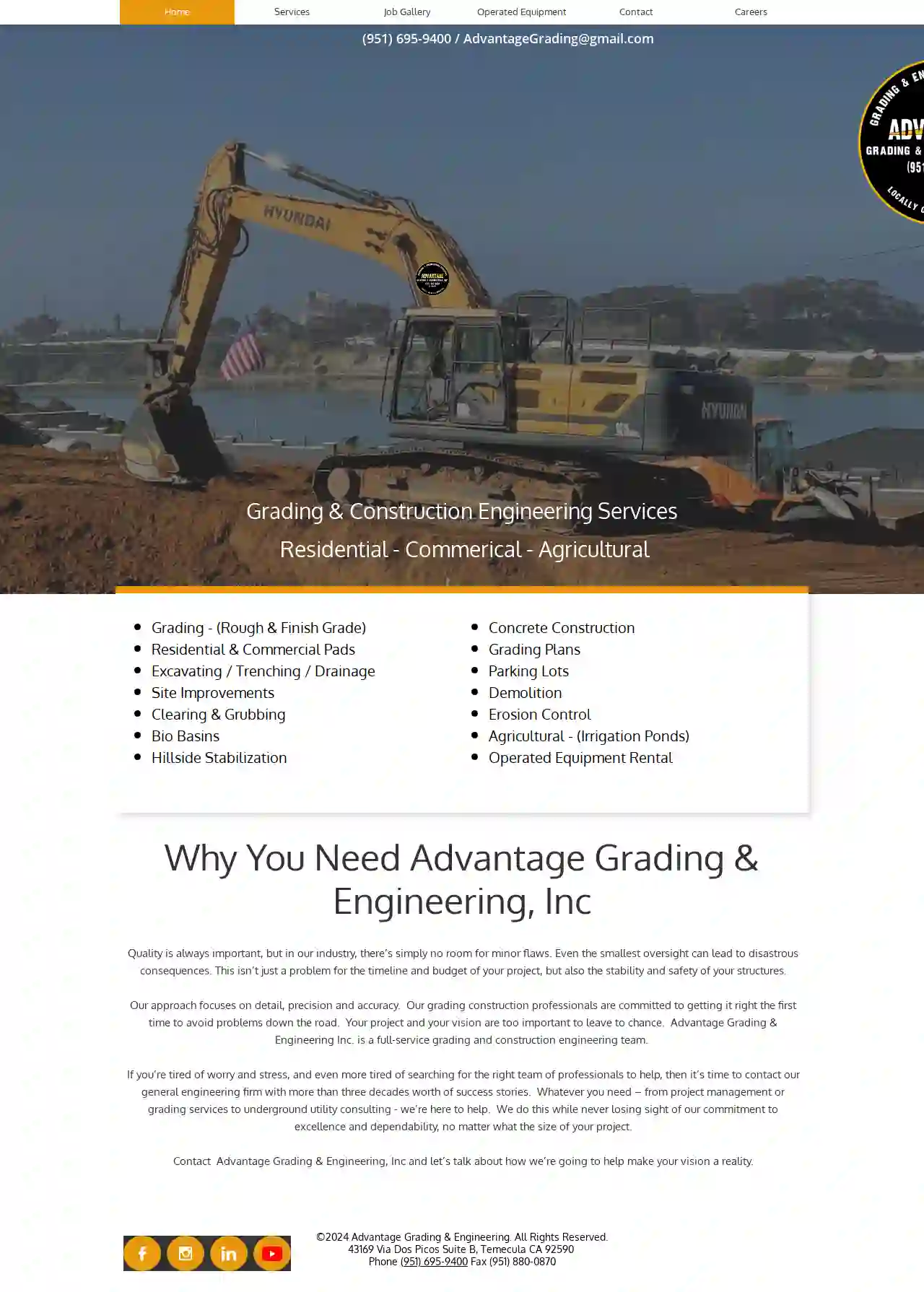Excavation Contractors Temecula
Best Excavation Company Near Me in Temecula
Receive 3 FREE Excavation Companies quotes for your project today! Compare profiles, reviews, accreditations, portfolio, etc... and choose the best deal.

Maverick Rock Breaking
4.52 reviewsTemecula, US- Services
- Why Us?
Get Quote
CertifiedSeptic.com
526 reviewsTemecula, US- Services
- Why Us?
Get Quote
Del Rio Co.
1Temecula, US- Services
- Why Us?
Get Quote
C T Concrete Cutting, Inc.
51 reviewsTemecula, US- Services
- Why Us?
Get Quote
JPI Development Group, Inc.
44 reviewsTemecula, US- Services
- Why Us?
Get Quote
Advantage Grading & Engineering, Inc.
4.311 reviews1000 Scottsville Rd, Rochester, 14624, USAdvantage Grading & Engineering: Your Trusted Partner for Site Development Advantage Grading & Engineering is a family-owned and operated business with over 20 years of experience in the industry. We are committed to providing our clients with the highest quality site development services at competitive prices. We specialize in a wide range of services, including: Site preparation Grading Drainage Utilities Paving Landscaping We are dedicated to providing our clients with the best possible service. We are always available to answer your questions and address your concerns. We are also committed to safety and environmental responsibility. We are proud to be a part of the community and we are committed to providing our clients with the best possible experience.
- Services
- Why Us?
Get Quote
Burchett Grading, Inc.
4.47 reviewsPo Box 892863, Temecula, 92589, USABOUT US Burchett Grading, Inc. is a full service grading and excavation company that has been in business for almost 50 years. President, Craig Burchett is a third generation heavy equipment operator. Coming from a family of farmers, the family business was started by his father, Gene Burchett back in the 1970's and he was known in the industry as one of the best operators around. Starting mainly as an AG prep contractor, most of the avocado groves were prepped by Gene, as he was one of the only graders in town that would clear and prep the steepest hills. Beyond that, Gene was a mainstay hired heavy equipment operator contracted with Cal-Fire and shifted his focused on residential house pads. Craig followed in his dad's footsteps and quickly developed his father's keen eye for dirt. In the recent years, BGI expanded it's services to more than just grading, but undertaking the entirety of civil plans and offering more diverse services such as storm drain and wet/dry utilities. Craig brings his extensive knowledge, experience, integrity and passion for dirt work that leaves nothing less than exceptional results. Our priority is to oversee your project, big or small, from start to finish, and to ensure that everything goes smoothly and is done right the first time. Our mission is to exceed your expectations. We would love the opportunity to work with you and look forward to hearing from you! OUR MISSION We know how challenging and daunting construction projects can be. This is why it is crucial to have the right contractor that can help face these challenges and give you the results you need. We are committed to excellence and the job at hand is always our top priority. We believe integrity, knowledge and extensive experience is the driving force of a successful construction project and we strive to attain nothing less. Whatever your vision may be, we are here to ensure your vision is carried out.
- Services
- Why Us?
- Gallery
Get Quote
Over 3,943+ Excavation Contractors on our platform
Our excavation experts operate in Temecula and surrounding areas!
ExcavationHQ has curated and vetted Top Excavation Businesses in and around Temecula. Find the most reliable business today.
Frequently Asked Questions About Excavation Contractors
- Hauling to Designated Disposal Sites: Transporting excavated material to approved landfills or recycling centers.
- Recycling or Reuse: If suitable, some excavated soil might be recycled for other projects or reused on-site for landscaping or backfilling.
- Complying with Regulations: Adhering to local and environmental regulations for soil disposal to prevent contamination or illegal dumping.
- Excavations Deeper Than a Certain Depth: This varies by jurisdiction, usually around 5 feet.
- Excavations Near Utilities: Digging near buried utilities (gas, water, electric) often requires permits and utility locates to prevent damage.
- Excavations Affecting Public Property: Projects impacting sidewalks, roads, or other public areas typically require permits.
- Excavations in Environmentally Sensitive Areas: Projects in wetlands, floodplains, or other sensitive areas might need special permits.
- Basement Size: The larger the basement, the more excavation is required, increasing the cost.
- Soil Type: Excavating rocky or dense clay soil is generally more expensive than loose soil.
- Accessibility: Difficult-to-access sites might require specialized equipment or more labor, driving up costs.
- Foundation Type: The chosen foundation type (full basement, crawl space, slab) affects excavation needs.
- Underpinning: If underpinning (strengthening existing foundations) is necessary, it significantly increases costs.
- Disposal Fees: Hauling excavated soil to disposal sites adds to the overall expense.
- Project Type and Size: Ensure the contractor has experience handling projects similar to yours in scale and complexity.
- Reputation and Reviews: Check online reviews and testimonials, and request references from previous clients.
- Licensing and Insurance: Verify that the contractor is properly licensed and insured to protect you from liability.
- Equipment and Resources: Confirm that they have the necessary equipment and resources for your project's needs.
- Communication and Transparency: Choose a contractor who communicates clearly, provides detailed estimates, and keeps you informed throughout the project.
- Safety Record: Inquire about their safety protocols and track record to ensure a safe work environment.
- Price: While price is important, it shouldn't be the only deciding factor. Balance affordability with experience, reputation, and quality of service.
How do you handle soil disposal after excavation?
Do I need a permit for excavation?
How much does it cost to excavate a basement?
How do I choose the right excavation contractor for my project?
How do you handle soil disposal after excavation?
- Hauling to Designated Disposal Sites: Transporting excavated material to approved landfills or recycling centers.
- Recycling or Reuse: If suitable, some excavated soil might be recycled for other projects or reused on-site for landscaping or backfilling.
- Complying with Regulations: Adhering to local and environmental regulations for soil disposal to prevent contamination or illegal dumping.
Do I need a permit for excavation?
- Excavations Deeper Than a Certain Depth: This varies by jurisdiction, usually around 5 feet.
- Excavations Near Utilities: Digging near buried utilities (gas, water, electric) often requires permits and utility locates to prevent damage.
- Excavations Affecting Public Property: Projects impacting sidewalks, roads, or other public areas typically require permits.
- Excavations in Environmentally Sensitive Areas: Projects in wetlands, floodplains, or other sensitive areas might need special permits.
How much does it cost to excavate a basement?
- Basement Size: The larger the basement, the more excavation is required, increasing the cost.
- Soil Type: Excavating rocky or dense clay soil is generally more expensive than loose soil.
- Accessibility: Difficult-to-access sites might require specialized equipment or more labor, driving up costs.
- Foundation Type: The chosen foundation type (full basement, crawl space, slab) affects excavation needs.
- Underpinning: If underpinning (strengthening existing foundations) is necessary, it significantly increases costs.
- Disposal Fees: Hauling excavated soil to disposal sites adds to the overall expense.
How do I choose the right excavation contractor for my project?
- Project Type and Size: Ensure the contractor has experience handling projects similar to yours in scale and complexity.
- Reputation and Reviews: Check online reviews and testimonials, and request references from previous clients.
- Licensing and Insurance: Verify that the contractor is properly licensed and insured to protect you from liability.
- Equipment and Resources: Confirm that they have the necessary equipment and resources for your project's needs.
- Communication and Transparency: Choose a contractor who communicates clearly, provides detailed estimates, and keeps you informed throughout the project.
- Safety Record: Inquire about their safety protocols and track record to ensure a safe work environment.
- Price: While price is important, it shouldn't be the only deciding factor. Balance affordability with experience, reputation, and quality of service.